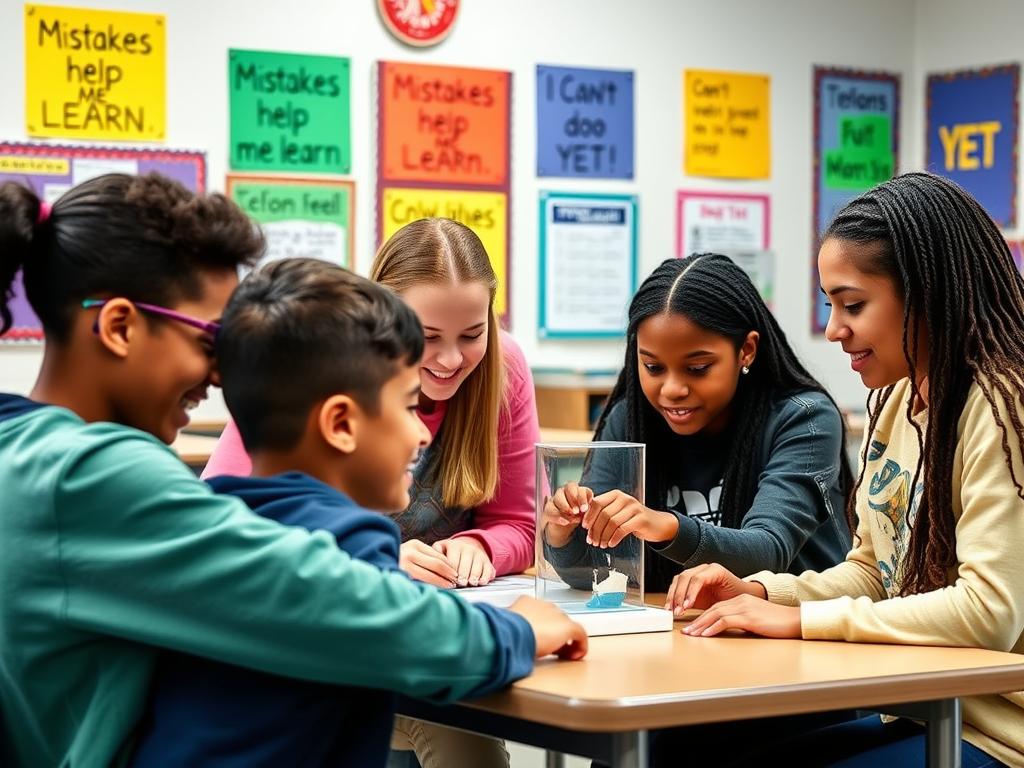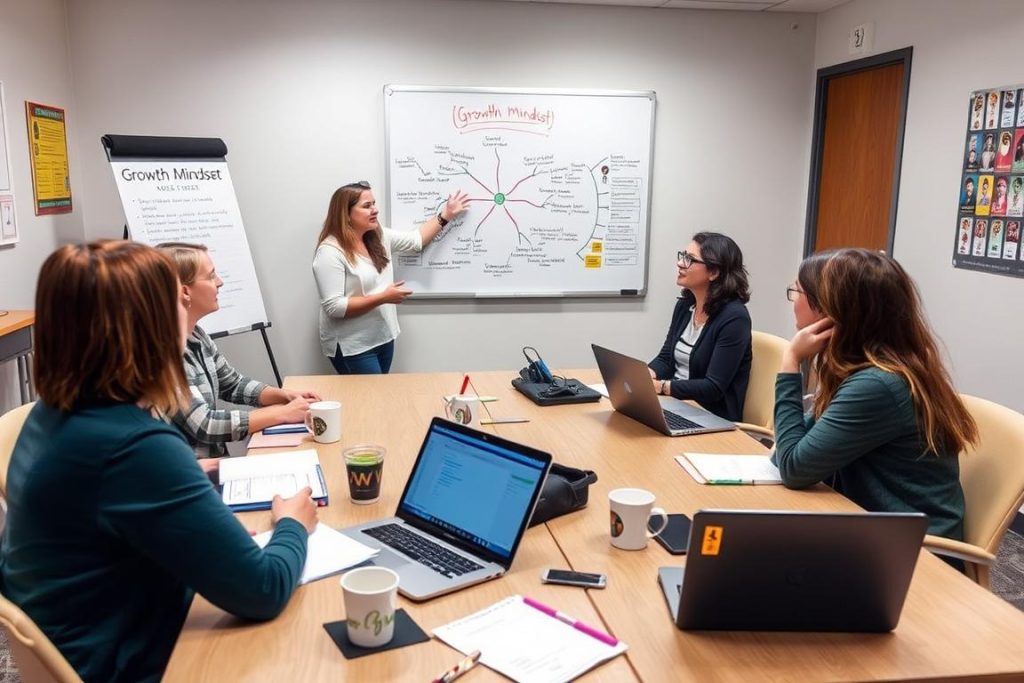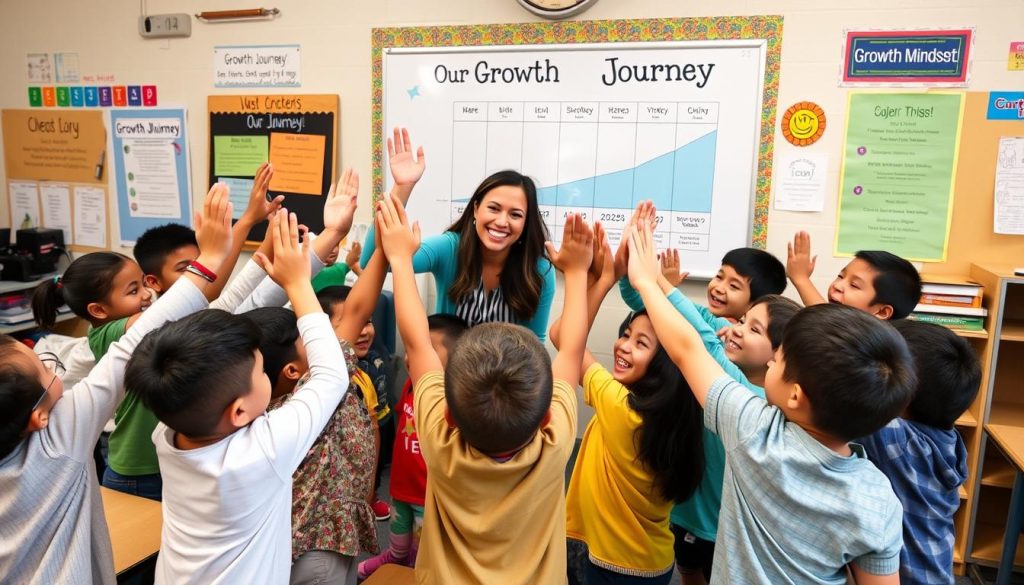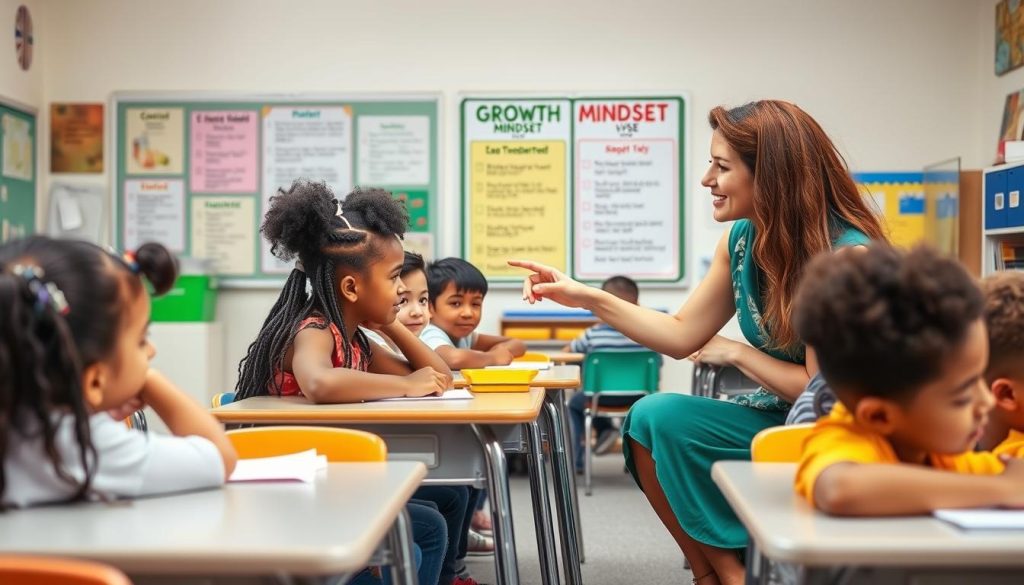Growth mindset principles can transform how students approach learning challenges
Understanding the Growth Mindset Concept
Developed by Stanford psychologist Dr. Carol Dweck, a growth mindset is the belief that abilities can be developed through dedication, hard work, and learning from feedback. This contrasts with a fixed mindset, where individuals believe their talents and intelligence are static traits. According to research from Mindset Works, students with a growth mindset understand that effort makes them stronger and that they can continue developing their abilities throughout life.
For K12 teachers, recognizing the difference between these mindsets is crucial. When students believe their intelligence is fixed, they tend to:
- Avoid challenges for fear of failure
- Give up easily when obstacles arise
- See effort as fruitless
- Ignore constructive feedback
- Feel threatened by others’ success
Conversely, students with a growth mindset typically:
- Embrace challenges as opportunities to grow
- Persist despite setbacks
- View effort as necessary for mastery
- Learn from criticism
- Find inspiration in others’ success
Developing teacher skills in recognizing and addressing these mindset differences can dramatically change how students engage with learning. When teachers themselves adopt a growth mindset, they model resilience and continuous improvement for their students.
The Benefits of a Growth Mindset for Student Achievement
The benefits of a growth mindset for students are well-documented and far-reaching. A 2016 study published in the Proceedings of the National Academy of Sciences found that students who were taught about growth mindset showed significant improvements in academic performance, particularly those who had previously been at risk of dropping out.

Academic Resilience
One of the most significant benefits of a growth mindset is increased resilience when facing academic challenges. Students learn to view mistakes as opportunities rather than failures. This shift in perspective helps them bounce back from setbacks and persist through difficult material. Teacher skills in fostering this resilience include providing specific feedback that focuses on process rather than ability, and creating safe spaces for students to take risks.
Increased Motivation
Students with a growth mindset tend to show higher levels of intrinsic motivation. Rather than studying solely for grades or external rewards, they develop genuine curiosity and enjoyment in the learning process itself. This internal drive leads to deeper engagement with material and more sustained effort over time.
Improved Learning Strategies
When students believe they can develop their abilities, they’re more likely to adopt effective learning strategies. They become more metacognitive—thinking about their own thinking—and can better evaluate which approaches work best for different types of learning challenges. Developing teacher skills in modeling these metacognitive practices helps students internalize these valuable habits.
Transform Your Classroom with Growth Mindset Principles
Discover our comprehensive guide to implementing growth mindset strategies in your K12 classroom. Get practical activities, assessment tools, and lesson plans designed by experienced educators.
The Benefits of a Growth Mindset for Teacher Development
The benefits of a growth mindset extend beyond student outcomes—they significantly impact teacher effectiveness and satisfaction as well. When educators embrace a growth mindset in their own professional development, they experience numerous advantages that enhance their teaching practice.

Professional development focused on growth mindset enhances teacher skills and collaboration
Enhanced Instructional Flexibility
Teachers with a growth mindset are more willing to experiment with new teaching strategies and adapt their methods based on student needs. This flexibility allows them to reach diverse learners more effectively and continuously improve their practice. Essential teacher skills like differentiation and responsive teaching develop more naturally when educators believe in their capacity to grow.
Improved Resilience to Challenges
Teaching is inherently challenging, with new obstacles arising regularly. Educators with a growth mindset view these challenges as opportunities to develop new skills rather than insurmountable problems. This resilience helps prevent burnout and maintains enthusiasm for the profession even during difficult periods.
More Effective Feedback Practices
Understanding the principles of growth mindset transforms how teachers provide feedback to students. Rather than generic praise or criticism, growth-minded educators offer specific, process-oriented feedback that helps students understand exactly how to improve. These advanced teacher skills in feedback delivery significantly impact student growth.
“When teachers develop a growth mindset, they create classroom environments where risk-taking is valued and mistakes are seen as learning opportunities. This fundamentally changes the learning experience for students.”
– Dr. Carol Dweck, Stanford University
Implementing the Benefits of a Growth Mindset in Your Classroom
Translating growth mindset theory into classroom practice requires intentional strategies and consistent reinforcement. Here are practical approaches for K12 teachers to foster a growth mindset culture:
Language and Messaging
The words we use as educators powerfully shape student mindsets. Developing teacher skills in growth-oriented language means:
- Adding “yet” to statements about challenges (“I don’t understand this yet“)
- Praising effort, strategies, and progress rather than intelligence
- Reframing mistakes as valuable learning opportunities
- Discussing the brain’s ability to grow and form new connections
- Modeling positive self-talk when facing challenges
Teaching About the Brain
When students understand how their brains physically change and grow with learning, they’re more likely to adopt a growth mindset. Simple neuroscience lessons about neuroplasticity can be incorporated into various subjects. Many teacher skills now include the ability to translate complex neuroscience into age-appropriate lessons that empower students.
Celebrating Process and Progress
Create classroom rituals that highlight growth rather than just achievement. This might include:
- “Growth spotlights” where students share strategies that helped them overcome challenges
- Displaying work that shows progression and improvement over time
- Reflection journals where students document their learning journey
- Class discussions about famous figures who demonstrated perseverance
Earn Professional Development Credits
Enhance your teacher skills and advance your career while learning to implement growth mindset strategies in your classroom. Our accredited courses provide both practical classroom tools and professional development credits.
Overcoming Challenges to Experiencing the Benefits of a Growth Mindset
While the benefits of a growth mindset are compelling, implementing this approach isn’t without challenges. Understanding common obstacles and developing teacher skills to address them is essential for success.

Individual support is crucial when helping students overcome fixed mindset barriers
Deeply Ingrained Fixed Mindsets
Many students arrive in our classrooms with firmly established fixed mindsets, particularly by upper elementary and middle school. Years of messages about fixed intelligence or natural talent can be difficult to overcome. Developing teacher skills in recognizing and addressing these ingrained beliefs requires patience and consistent reinforcement of growth-oriented messages.
Signs of Fixed Mindset in Students:
- Giving up quickly when challenged
- Saying things like “I’m just not good at math”
- Hiding mistakes or becoming defensive
- Avoiding challenges they might not excel at
- Feeling threatened by peers’ success
Teacher Skills to Address Fixed Mindset:
- Normalize struggle as part of learning
- Share personal stories of overcoming challenges
- Provide specific, process-oriented feedback
- Create safe spaces for risk-taking
- Celebrate improvement and effort consistently
Systemic Barriers
School systems often inadvertently reinforce fixed mindsets through practices like ability grouping, competitive grading, and emphasis on standardized testing. Developing teacher skills to create growth-oriented environments within these constraints requires creativity and intentionality.
Consider implementing these approaches:
- Use formative assessment and opportunities for revision
- Create grading practices that value growth and improvement
- Provide multiple pathways to demonstrate understanding
- Explicitly teach that standardized tests measure current knowledge, not potential
Teacher Tip: When discussing standardized tests with students, frame them as a snapshot of current understanding rather than a measure of intelligence or future potential. This helps students maintain a growth mindset even within testing environments.
Measuring the Benefits of a Growth Mindset in Your Classroom
To effectively implement growth mindset principles, teachers need ways to assess their impact. Developing teacher skills in measuring mindset changes helps educators refine their approaches and demonstrate the value of this work.
Observation and Documentation
Systematic observation of student behaviors provides valuable insights into mindset development. Look for changes in:
- How students respond to challenging tasks
- The language they use when facing difficulties
- Their willingness to revise work and incorporate feedback
- Peer interactions during collaborative problem-solving
Documenting these observations through anecdotal notes or structured protocols helps track progress over time. Advanced teacher skills in observational assessment allow for more nuanced understanding of mindset development.
Student Self-Assessment
Engaging students in reflecting on their own mindset development builds metacognition while providing valuable data. Consider using:
- Mindset surveys at multiple points throughout the year
- Reflection journals where students document their approach to challenges
- Exit tickets that prompt students to consider their learning process
- Student-led conferences where learners discuss their growth journey
Get Our Growth Mindset Assessment Toolkit
Access our comprehensive collection of assessment tools, observation protocols, and student self-reflection templates designed specifically for K12 classrooms.
Academic Indicators
While mindset itself is important, the ultimate goal is improved learning outcomes. Look for connections between mindset development and:
- Increased persistence on challenging tasks
- Improved academic performance, particularly for struggling students
- Greater willingness to attempt advanced material
- Higher quality revisions and improvements to work
Developing teacher skills in connecting mindset measures to academic outcomes helps demonstrate the practical value of growth mindset approaches to colleagues, administrators, and parents.
Embracing the Transformative Benefits of a Growth Mindset
The benefits of a growth mindset extend far beyond academic achievement—they prepare students for lifelong learning and resilience in an ever-changing world. As K12 teachers, we have the privilege and responsibility of shaping not just what students know, but how they approach learning throughout their lives.
By developing our teacher skills in fostering growth mindsets, we create classroom environments where:
- Students view challenges as opportunities rather than threats
- Effort is understood as the path to mastery
- Feedback is welcomed as a tool for improvement
- Setbacks are temporary and instructive rather than defining
- The success of others inspires rather than intimidates
These mindset shifts have profound implications not just for academic success, but for students’ emotional well-being, social relationships, and future professional lives. The teacher skills we develop in promoting growth mindsets may be among the most valuable gifts we can offer our students.

Creating a classroom culture that celebrates growth transforms the learning experience
Continue Your Professional Growth Journey
Join thousands of educators who are enhancing their teacher skills and transforming their classrooms through our comprehensive growth mindset resources and professional development opportunities.




